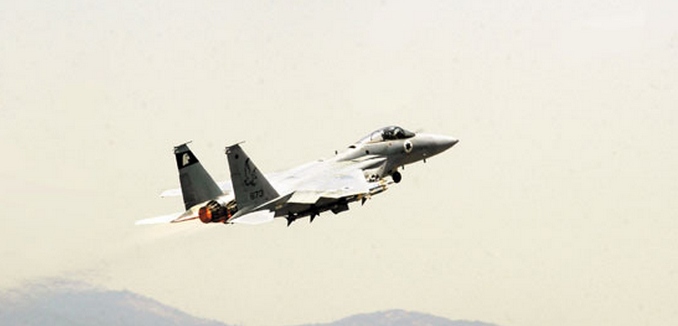Israeli Defense Minister Avigdor Liberman acknowledged his country’s recent airstrikes against Syrian targets, saying in an address to European Union ambassadors on Wednesday that the strikes were meant to prevent Hezbollah from receiving “advanced weapons, military equipment and weapons of mass destruction.”
Though it is unusual for an Israeli government official to acknowledge airstrikes that take place on foreign soil, the country’s leaders have publicly made it clear that they will not allow the Iran-backed terror group to cross its red lines.
The Israel Defense Forces reportedly carried out two strikes last week: on a site near the Damascus airport, and on a convoy travelling along the Beirut-Damascus highway. Syrian media reported Wednesday that the IDF also struck the Mazzeh military airport near Damascus earlier that morning, using missiles fired from the Golan Heights.
Large explosions at Mezzeh military airbase in #Damascus this early AM, unconfirmed if targeted by airstrike/rockets or fault pic.twitter.com/IrVNY4NXbb
— Sami (@Paradoxy13) December 7, 2016
Hezbollah has been building up its offensive military capacity in Lebanon near the Israeli border. The IDF released a declassified map on Tuesday showing how Hezbollah has embedded its arsenal inside civilian areas, increasing the likely devastation of the next war against Israel.
It was reported in 2013 that Hezbollah was paying poor Shi’ite families in southern Lebanon to allow them to store weapons in their homes, effectively making them human shields.
An Israeli defense official told The New York Times in May 2015 that Hezbollah’s buildup in southern Lebanese villages meant that “civilians are living in a military compound….We will hit Hezbollah hard, while making every effort to limit civilian casualties as much as we can…[but] we do not intend to stand by helplessly in the face of rocket attacks.” A few days later, a newspaper linked to Hezbollah confirmed the Israeli assessment.
Hezbollah has “turned the Shiite villages…into essentially missile silos,” Jonathan Schanzer, the vice president for research at the Foundation for Defense of Democracies, said in July.
Noting the threat posed by Hezbollah’s extensive rocket arsenal and its placement among civilians, Geoff Corn, an international military law expert at the South Texas College of Law, observed earlier this year that the resulting devastation from a war with these conditions would “both legally and morally…lie solely at the feet of Hezbollah.”
United Nations Security Council Resolution 1701, which was passed unanimously to end the 2006 war between Israel and Hezbollah, forbids countries from transferring weapons to the terror organization. However, Iran has continued to arm Hezbollah, and the Security Council has refused to act to enforce the resolution.
[Photo: Israeli Air Force ]




